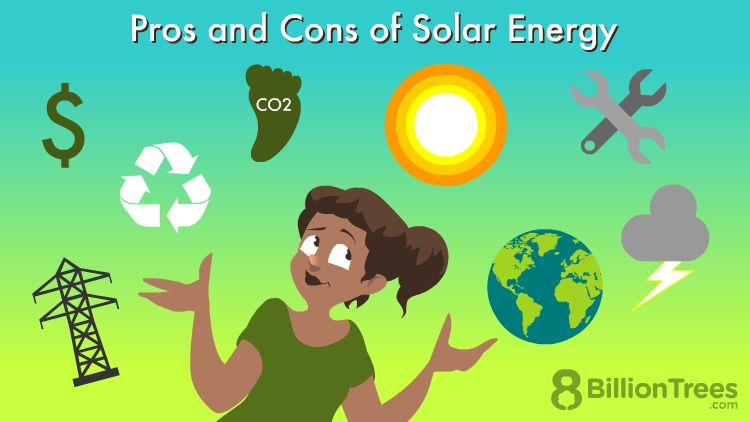What Are The Positives And Negatives Of Solar Energy?

Solar energy is one of the most promising renewable energy sources available today. It converts the sun’s rays into usable light, heat, and electricity through technologies like photovoltaic panels and concentrated solar power. The key benefits of solar are that it is clean, renewable, reduces reliance on fossil fuels, and promotes energy independence. However, there are also challenges like high upfront costs and lack of sunlight in some regions. This article provides an overview of the main pros and cons to consider when evaluating solar energy.
Pros of Solar Energy
Solar energy is a clean and renewable energy source. Unlike fossil fuels, solar energy does not directly produce air pollutants or greenhouse gases. Generating electricity from solar energy instead of fossil fuels avoids the emissions of pollutants that can worsen air quality and contribute to acid rain, health problems, climate change, and environmental degradation (1).
Using solar energy reduces the reliance on fossil fuels like coal, oil and natural gas. These fossil fuels are finite resources that will eventually dwindle as global supplies decline. Solar energy provides a renewable alternative that can diversify energy portfolios (2).
Solar energy systems can provide long-term cost savings. Though the initial investment for purchasing and installing solar panels can be high, solar energy is free once the system is in place. Government incentives like tax credits can help offset the upfront costs as well. The savings over the system’s lifetime generally outweigh the initial expenses (3).
Solar energy promotes energy independence by allowing people to generate their own electricity. With more localized and decentralized electricity production, communities don’t have to depend as heavily on external utility companies or imported fuels (2).
The solar energy industry is a source of economic growth and job creation. Solar jobs increased 167% over the past decade in the United States, employing over 230,000 people in 2020. Solar energy can create local employment opportunities in manufacturing, installation, maintenance, sales, and more (4).
Solar energy systems have versatile applications. In addition to solar panels for electricity generation, solar energy can be harnessed for purposes like heating water, warming and lighting buildings, charging devices, and more. Solar energy can be implemented on both small and large scales (1).
Sources:
1. https://www.constellation.com/energy-101/energy-innovation/solar-energy-pros-and-cons.html
2. https://www.enelgreenpower.com/learning-hub/renewable-energies/solar-energy/advantages-solar-energy
3. https://www.energy.gov/energysaver/benefits-residential-solar-electricity
4. https://www.seia.org/solar-industry-research-data
Solar Energy is Clean and Renewable
One of the biggest benefits of solar energy is that it is a clean and renewable resource. Solar panels don’t produce any air or water pollution while generating electricity. This makes solar a much more environmentally friendly option compared to fossil fuels like coal and natural gas, which release pollutants that contribute to issues like acid rain, smog and climate change (Source: https://www.nrdc.org/stories/renewable-energy-clean-facts).
Solar energy is also considered renewable because it comes from the sun, which will continue shining for billions of years to come. It is an infinite resource, unlike fossil fuels which are finite and being depleted much faster than they are being created. We won’t run out of sunshine the way we could run out of oil, coal and natural gas. This makes solar a sustainable long-term energy solution.
Reduces Reliance on Fossil Fuels
Fossil fuels like coal, oil, and natural gas are non-renewable sources of energy that take millions of years to form. Relying heavily on fossil fuels is not sustainable in the long term as these resources are finite and will eventually run out.
Solar energy provides a renewable alternative that reduces our dependence on limited fossil fuel supplies. The US Energy Information Administration estimates that roughly 20% of US electricity generation came from renewable sources like solar in 2020, displacing those MW/h that would have otherwise come from fossil fuels.
According to RevisionEnergy.com, residential solar installations in the US will have prevented over 13.5 million tons of CO2 emissions from fossil fuel energy sources in 2021 alone. Widespread adoption of solar energy can significantly curb our reliance on polluting fossil fuels.
Potential Cost Savings
One of the biggest advantages of solar energy is the potential for significant long-term cost savings, both for consumers and electric utilities.
For homeowners and businesses, installing solar panels represents a significant upfront investment. However, solar panels can generate electricity for 25 years or more, allowing consumers to recoup the installation costs over time through lower electricity bills. Once the panels are paid off, solar provides virtually free electricity for decades.
Electricity from solar also helps avoid paying costly peak energy rates from utilities during times of high demand. By generating your own power during the day, you reduce the amount you need to buy from the grid when rates are highest.
From an electric utility perspective, increasing solar energy usage helps lower the need for expensive investments in transmission lines, power plants, and other infrastructure to meet peak demand. Solar energy production coincides with peak usage times during the day. Less strain on the grid and deferred upgrades lead to lower costs that can be passed onto ratepayers.
In addition, decentralized rooftop solar generation located at or near where energy is consumed reduces the amount of electricity lost in distribution. This further improves the cost-effectiveness and efficiency of the electrical grid.
Promotes Energy Independence
One of the big benefits of solar energy is that it allows homes and businesses to produce their own electricity, making them less reliant on imported energy sources (Gain Energy Independence). With a solar energy system, you can generate clean electricity right where you need it, rather than depending on far away power plants. This promotes energy independence and security (Energy Independence and Security). The more energy that is produced locally through solar panels, the less the country needs to import fossil fuels and other energy sources. Energy independence is important for national security, economic stability, and controlling energy costs. Solar energy allows people to take control of their own energy production and not be as impacted by global energy markets and geopolitics. By going solar, homes and businesses can shelter themselves from unpredictable energy prices and supply issues.
Creates Jobs
The solar energy industry has created hundreds of thousands of jobs in manufacturing, installation, and maintenance. According to the U.S. Department of Energy, there were over 250,000 jobs in solar energy in 2021, representing an increase of 9% from 2020. Many of these jobs are in manufacturing as the domestic solar industry continues to expand and open new facilities. The Solar Energy Industries Association estimates that nearly 80% of solar jobs in the U.S. are in installation. As more homes and businesses adopt rooftop solar, there is growing demand for skilled workers to install and maintain solar panels. There are also opportunities in operations and maintenance as existing solar farms require upkeep and servicing over their lifespan. Overall, the solar industry is a major and rapidly growing employer in the renewable energy sector.
Versatile Applications
One major benefit of solar energy is how versatile it is in its applications. Solar power can be used for electricity, heating, powering vehicles, calculators, satellites, and more. For electricity, solar photovoltaic panels can convert sunlight directly into electrical current. Solar thermal energy can also be used to heat water or spaces. Solar energy powers the Mars rovers and satellites orbiting Earth. Cars can run on solar energy using panels installed on the vehicle.
Solar-powered calculators are very common, using small solar cells to charge a battery inside the device. Even simple things like solar-powered garden lights take advantage of the sun’s energy. Solar energy is being applied in many innovative ways, like roads embedded with solar panels.
As this article describes, solar energy has applications in agriculture, industry, transportation, and infrastructure. The versatile nature of solar power makes it useful across many sectors of society.
Cons of Solar Energy
While solar energy has many benefits, there are some downsides to consider as well. Some of the main cons of solar energy include:
High upfront costs – The initial cost of purchasing and installing solar panels and related equipment is very high. This can make solar power financially out of reach for many households and organizations.
Intermittency – Solar energy relies on sunlight, which isn’t available at night or on very cloudy or stormy days. Battery storage can help mitigate this issue, but adds even more to the upfront cost.
Land use – Solar farms can take up large amounts of land space. Rooftop solar on homes and buildings helps alleviate this concern.
Toxic materials – Some solar panel components contain hazardous materials like lead and cadmium. Proper solar panel disposal is important to avoid contaminating the environment.
Conclusion
In summary, solar energy has both advantages and disadvantages. On the positive side, it is a renewable and clean energy source that can reduce reliance on fossil fuels, provide cost savings, promote energy independence, and create jobs. The main downsides are that solar technology can be expensive to install and has variability issues since solar irradiation depends on location, time of day, and weather conditions. However, the outlook for solar energy continues to improve as costs decline and storage solutions help mitigate intermittency problems. With further research and development, solar power has the potential to become a major pillar of the global energy supply.






